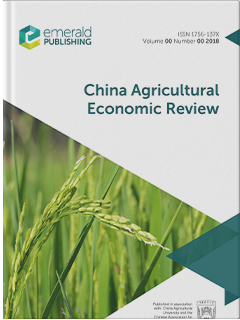Storage losses, market development and household maize-selling decisions in China
IF 4.6
2区 经济学
Q1 AGRICULTURAL ECONOMICS & POLICY
引用次数: 2
Abstract
PurposeThe purpose of this paper is to analyse the impacts of storage losses and market development on the maize-selling behaviours of rural households in China.Design/methodology/approachBased on the survey data of 543 households from nine major maize production provinces in China, the authors introduce storage losses to a household's maize-selling decision-making model and use fractional logit model and ordered probit model to empirically analyse the impact of maize storage losses and market development on household maize-selling decisions in China. To overcome potential endogeneity problems, the authors select the weather at drying (whether bad weather occurs during the drying process) and harvest loss as instrumental variables and re-estimate the model.FindingsThe results show that increased storage losses prompt farmers to increase the proportion of maize sold within three months after harvest and sell maize in advance. Meanwhile, the degree of market development has a significant impact on farmers' maize-selling decisions. Other factors, such as the maize output, non-agricultural employment and awareness of loss control, also affect farmers' maize-selling behaviours.Research limitations/implicationsThe government should promote advanced storage facilities, reduce household storage losses, decrease the phenomenon of centralised sales after harvest and help farmers freely choose the suitable time for sales. The government also needs to strengthen market information releases and publicity, reduce transaction costs and help farmers make reasonable sales decisions.Originality/valueThe authors introduce storage losses as a separate variable in a farmer's grain-selling decision model to empirically analyse the impact of storage losses on farmers' grain-selling behaviours. Moreover, the authors analyse the impact of market development on household grain-selling behaviours in China. These findings can help avoid oversupply in the market during the harvest season and alleviate the pressure on the market from the supply and demand imbalance. These results are also beneficial for farmers waiting for a higher price and increasing their income.储存损失、市场开发和中国家庭玉米销售决策
目的分析储存损失和市场发展对我国农户玉米销售行为的影响。设计/方法/方法基于对我国9个玉米主产省543户农户的调查数据,将储藏损失引入家庭玉米销售决策模型,并利用分数logit模型和有序probit模型实证分析了中国玉米储藏损失和市场发展对家庭玉米销售决定的影响。为了克服潜在的内生性问题,作者选择干燥时的天气(干燥过程中是否发生恶劣天气)和收获损失作为工具变量,并重新估计模型。研究结果表明,储存损失的增加促使农民在收获后三个月内提高玉米的销售比例,并提前销售玉米。同时,市场发展程度对农民的玉米销售决策有显著影响。其他因素,如玉米产量、非农就业和损失控制意识,也影响农民的玉米销售行为。研究局限性/影响政府应推广先进的储存设施,减少家庭储存损失,减少收获后集中销售的现象,并帮助农民自由选择合适的销售时间。政府还需要加强市场信息发布和宣传,降低交易成本,帮助农民做出合理的销售决策。原创性/价值作者在农民粮食销售决策模型中引入储存损失作为一个单独的变量,以实证分析储存损失对农民粮食销售行为的影响。此外,作者还分析了市场发展对中国家庭粮食销售行为的影响。这些发现有助于避免收获季节市场供过于求,缓解供需失衡给市场带来的压力。这些结果也有利于等待更高价格和增加收入的农民。
本文章由计算机程序翻译,如有差异,请以英文原文为准。
求助全文
约1分钟内获得全文
求助全文
来源期刊

China Agricultural Economic Review
AGRICULTURAL ECONOMICS & POLICY-
CiteScore
9.80
自引率
5.90%
发文量
41
审稿时长
>12 weeks
期刊介绍:
Published in association with China Agricultural University and the Chinese Association for Agricultural Economics, China Agricultural Economic Review publishes academic writings by international scholars, and particularly encourages empirical work that can be replicated and extended by others; and research articles that employ econometric and statistical hypothesis testing, optimization and simulation models. The journal aims to publish research which can be applied to China’s agricultural and rural policy-making process, the development of the agricultural economics discipline and to developing countries hoping to learn from China’s agricultural and rural development.
 求助内容:
求助内容: 应助结果提醒方式:
应助结果提醒方式:


